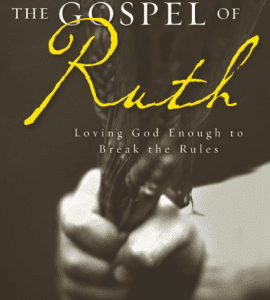A series by John based on The Gospel of Ruth by Carolyn Custis James.
Having established that The Book of Ruth is a nitty gritty Ancient Near Eastern story, not a “happily-ever-after” romance story, Carolyn Custis James offers her readers an unexpected perspective. Carolyn’s supported thesis is that Naomi is the central character of the book, not Ruth. Naomi goes to Moab with her husband and sons. Naomi’s family dies. Naomi pleads for her Moabite daughters-in-law to return to their country. Naomi’s near kinsman, Boaz, takes a part in the story. For their own survival’s sake, Naomi sends Ruth on a mission to Boaz. Naomi’s husband’s family name and property are in contention. The women in Bethlehem celebrate the birth of Obed by saying, “Naomi has a son.”
My shallow view of Naomi was conditioned by Naomi’s self-evaluation, “Don’t call me Naomi [“pleasant”]; call me Mara [“bitter”] because the Almighty has made my life very bitter” (Ruth 1:20). Another factor in making Naomi a grumpy player in the story is the popular version that makes Ruth the shining princess. Naomi slides into the role of the cranky, old mother-in-law who gets bailed out by the romance and marriage of Ruth and Boaz.
In contrast to this view, Custis James writes, “According to Scripture, Naomi’s wrestlings with God are weighty matters, not to be brushed aside as a matter of female disposition or minimized as some kind of hormonal episode. The Bible takes her seriously and expects us to do the same, for our own sakes as much as to honor he . . . Ironically, God’s purposes for humanity are riding on the shoulders of two women the world believes have lost their ability to contribute” (Gospel of Ruth, 79).
Naomi is not only the central character of the Book of Ruth, she stands even more remarkably as the Bible’s female version of Job. Both Job and Naomi experience very harsh suffering. They both wrestle with God about why their lives take such a sharp turn into deep pain. Carolyn writes, “I never connected emotionally with Naomi’s losses until I heard her compared to the legendary sufferer Job. That got my attention . . .The narrator does not intend for readers to watch as distant spectators while the anguished Naomi blurts out her true feelings toward God, but to enter the story as this female Job speaks out for us. Her story and Job’s are in our Bibles so that we will learn to be honest as they were about how badly we are hurting, to go ahead and ask the questions that are smoldering inside . . . “Naomi’s words are few, though her pain was as every bit as deep and her losses as devastating. Some may see this as an overstatement, but I think Naomi actually out-Jobed Job. Both tragically lost families and the life they worked to build. But Job was not alone. He still has his wife and community to surround him (such as they were). Job was not an immigrant and he was not a woman” (Gospel of Ruth, 37, 44).
Naomi, grieving widow and mother, past child-bearing and Ruth, new widow and apparently barren and an alien, trek back to Bethlehem. Taking Naomi seriously as a female Job infuses eternal significance into her desperation. It doesn’t ultimately matter how the culture sees Naomi or even how Naomi sees herself. The question is, “Is God good for Naomi?”












